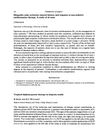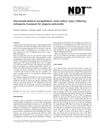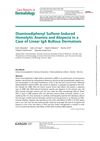5 citations,
May 2020 in “Journal of the American Academy of Dermatology” AGA might indicate higher risk for severe COVID-19.
 5 citations,
August 2018 in “PubMed”
5 citations,
August 2018 in “PubMed” An 8-year-old with severe hair loss regrew all hair after six months of tofacitinib treatment.
5 citations,
May 2017 in “Journal of dermatological science” The combined treatment effectively managed severe skin issues in Olmsted syndrome.
 5 citations,
October 2015 in “The American journal of pathology”
5 citations,
October 2015 in “The American journal of pathology” Mice with a mutated Dsg3 gene showed severe symptoms but not the typical blistering of pemphigus vulgaris.
5 citations,
May 2015 in “The Journal of Dermatology” Topical corticosteroids can help treat severe alopecia areata when other treatments fail.
5 citations,
October 2012 in “Australian veterinary journal” Two Australian Poll Hereford calves had severe anaemia, abnormal red blood cells, and skin issues.
 5 citations,
November 2001 in “PubMed”
5 citations,
November 2001 in “PubMed” An 80-year-old woman's severe hair loss was caused by a hormone-secreting ovarian tumor.
 5 citations,
July 1988 in “British journal of dermatology/British journal of dermatology, Supplement”
5 citations,
July 1988 in “British journal of dermatology/British journal of dermatology, Supplement” Diphencyprone therapy can effectively treat severe hair loss in motivated patients.
 4 citations,
January 2024 in “JEADV. Journal of the European Academy of Dermatology and Venereology/Journal of the European Academy of Dermatology and Venereology”
4 citations,
January 2024 in “JEADV. Journal of the European Academy of Dermatology and Venereology/Journal of the European Academy of Dermatology and Venereology” Baricitinib and ritlecitinib are recommended for severe alopecia areata, with other treatments available off-label.
 4 citations,
January 2022 in “Drug design, development and therapy”
4 citations,
January 2022 in “Drug design, development and therapy” Intramuscular corticosteroids are effective and safe for severe alopecia areata, with most patients regrowing hair, but nearly half may relapse.
 4 citations,
February 2020 in “Journal of Cosmetic Dermatology”
4 citations,
February 2020 in “Journal of Cosmetic Dermatology” Synthetic hair implants can cause severe scalp problems and removing them improves conditions; natural hair transplants are safer and more effective.
 3 citations,
September 2021 in “Journal of Nepal Medical Association”
3 citations,
September 2021 in “Journal of Nepal Medical Association” A woman with complete hair loss and severe hyperthyroidism was successfully treated with azathioprine and hydroxychloroquine.
3 citations,
August 2018 in “Therapeutics and Clinical Risk Management” Corticosteroid therapy for alopecia areata can cause severe hip bone damage.
3 citations,
June 2018 in “Internal Medicine” Recombinant thrombomodulin can effectively treat severe complications in Cronkhite-Canada syndrome.
 3 citations,
August 2010 in “Anais brasileiros de dermatologia/Anais Brasileiros de Dermatologia”
3 citations,
August 2010 in “Anais brasileiros de dermatologia/Anais Brasileiros de Dermatologia” A rare genetic disease caused severe, worsening hair loss from early childhood with poor treatment results.
 3 citations,
February 2010 in “Clinical kidney journal”
3 citations,
February 2010 in “Clinical kidney journal” Combining ciclosporin and simvastatin can cause severe kidney damage.
2 citations,
May 2023 in “Biology” New mouse models of Pemphigus show severe symptoms and need better treatments.
2 citations,
April 2023 in “PubMed” Improving maternal diets can prevent severe health issues, including death, from goiter in goat kids.
 2 citations,
March 2023 in “Frontiers in medicine”
2 citations,
March 2023 in “Frontiers in medicine” A 15-year-old boy's severe scalp condition improved significantly with adalimumab and baricitinib treatment.
2 citations,
January 2023 in “Frontiers in Veterinary Science” Buffalo flies and Stephanofilaria nematodes cause severe skin lesions in beef cattle, and treatment should target both.
 2 citations,
September 2022 in “Dermatologic Therapy”
2 citations,
September 2022 in “Dermatologic Therapy” Tofacitinib is a promising treatment for severe alopecia areata, with many patients experiencing complete or partial hair regrowth.
 2 citations,
August 2022 in “Clinical Case Reports”
2 citations,
August 2022 in “Clinical Case Reports” A 17-year-old girl had severe, on-and-off hair loss, likely due to COVID-19. She was treated with Vitamin D3, biotin, and other supplements, and saw some improvement within a month.
 2 citations,
September 2021 in “JAAD case reports”
2 citations,
September 2021 in “JAAD case reports” Dupilumab helped a woman with severe hair loss regrow her hair quickly and maintain it for six months after stopping treatment.
2 citations,
January 2021 in “Clinical dermatology review” Modified PRP therapy successfully treated severe alopecia unresponsive to traditional methods.
 2 citations,
October 2020 in “Annals of Oncology”
2 citations,
October 2020 in “Annals of Oncology” Men may be more vulnerable to severe COVID-19 due to genetic and hormonal factors, but more research is needed.
 2 citations,
December 2018 in “Journal of cosmetic dermatology”
2 citations,
December 2018 in “Journal of cosmetic dermatology” Higher CRBP1 levels are linked to more severe alopecia areata.
2 citations,
January 2018 in “Indian dermatology online journal” A homeopathic antidandruff shampoo caused severe hair matting in a girl.
 2 citations,
January 2017 in “Clinical and medical investigations”
2 citations,
January 2017 in “Clinical and medical investigations” Herbal lotions are effective for severe hair loss, with a 64.8% success rate, but relapse is common and long-term management requires allergen control and possible corticosteroid use.
 2 citations,
July 2016 in “Pharmacopsychiatry”
2 citations,
July 2016 in “Pharmacopsychiatry” A person with Turner Syndrome showed severe schizophrenia that didn't respond to treatment and had brain shrinkage.
 2 citations,
July 2015 in “Case Reports in Dermatology”
2 citations,
July 2015 in “Case Reports in Dermatology” DDS treatment for LABD can cause severe side effects like anemia and hair loss, requiring careful monitoring.


















